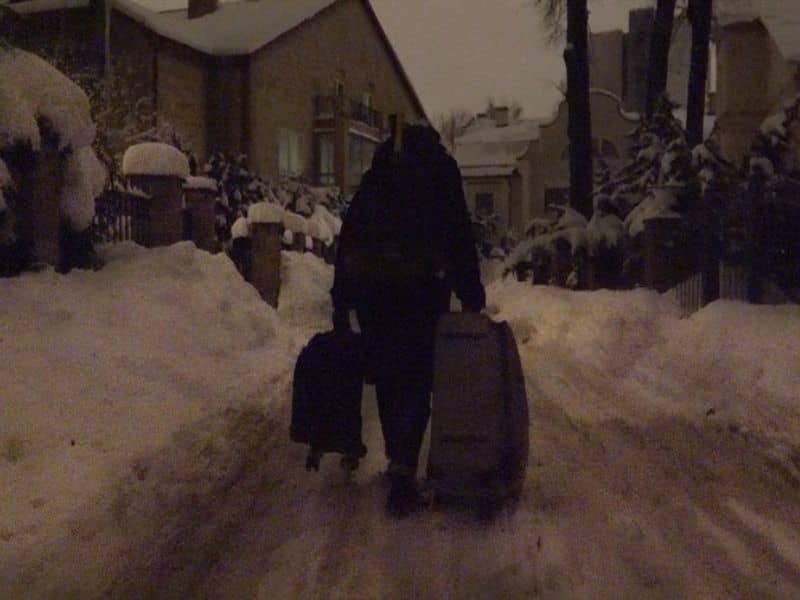Dok.cetera: April’s Documentary Recommendations
Across the non-fiction circuit, April brings the unofficial start to spring festival season. This year, it is one that extends well into summer due to… well, you already know. Currently happening online (and with last week’s announcement of the country’s cinemas reopening) and on location in Nyon, Switzerland, Visions du Réel presents its 52nd(!) edition between April 15–25. Then, right in the middle of that event, Copenhagen’s CPH:DOX kicks off on April 21 through May 12. The North American continent also sees two prominent non-fiction festival events as Toronto’s Hot Docs kicks off April 30 through May 9, and New York City’s Film at Lincoln Center’ New Directors/New Films (screening, amongst others, Taming the Garden – one of February’s documentary recommendations) taking place from April 28 to May 8.
It has also been a big month in Romanian documentary news with several films, projects, festivals, and screenings announced or taking place in various corners of the world.
– Prague’s famed dok.incubator workshop picking up Apropierea (Too Close), the next film from 2016 Astra Film Festival Best Director winner Botond Püsök.
– Andrei Dascalescu’s Holy Father was announced in the centerpiece competition at goEAST – The Festival of Central and Eastern European Film.
– DA Films curated and is currently streaming the – following his Golden Bear win for Bad Luck Banging or Looney Porn – appropriately titled Radu Jude: Forget About These Films!, which includes the online debut of his last non-fiction work The Exit of the Trains.
– The Institute of Documentary Film (IDF) streamed the interesting panel discussion Self Representation of Roma in Documentary Film, about the diversity of documentary films that are directed and produced by Roma filmmakers.
– One World Romania (May 21–June 6), which has announced much information on its 14th edition, including its Ulrike Ottinger retrospective and competition films.
Next month we will focus a bit more on Visions du Réel and CPH:DOX, but for April’s Dok.cetera we take a look at 4 films + 1 (4-part) series that you can stream right now. Like we did in February, here you will find films currently traversing the festival circuit, a couple of favorites already online, and a hidden gem.
On the Circuit

Faya Dayi (dir. Jessica Beshir) – Ethiopia, USA
A personal favorite Sundance 2021 premiere, Jessica Beshir’s stunning Faya Dayi immerses viewers into the everyday life of Harar, Ethiopia. Harar, the now Brooklyn-based Beshir’s birthplace, is a center for the harvest, trade, and consumption of khat – a leaf chewed mostly as a stimulant but also used for millennia as a staple of Sufi Muslim cultural rituals. It is also Ethiopia’s most profitable money crop to this day. With such an ubiquitous presence, khat provides livelihoods for many of Harar’s citizens. In operating as its narrative line, khat allows Faya Dayi to expound on individual stories and experiences, full of the light and dark one can expect from this elusive, albeit highly populated, part of the world built largely on a singular profit base. The idea of light and dark also distinguishes the film’s cinematography, with the entirety shot and presented in a crisp black & white, offering a desaturated tapestry of intimacy and honesty alongside the general volatility of substance dependency.
Beneath the country’s repressive regime, Ethiopian youth dream of opportunity, whether it be simply alleviating current poverty or a relocation. For many, the mental effects of khat allow such dreams to permeate the reality of sober-minded thought processes. On the other hand, its addictive qualities sometimes provide the exact opposite of what they desire. Rather than stimulation and aspiration, khat brings forth the kind of stifling hold any narcotic overuse can. Faya Dayi takes on these dynamics and more through its 10+ year journey to the screen.
Faya Dayi is currently screening at Visions du Reel, with Hot Docs and New Directors/New Films upcoming.

A River Runs, Turns, Erases, Replaces (dir. Shengze Zhu) – USA, China
As Wuhan, the origin point and early epicenter of COVID-19, largely puts the pandemic in its rear view mirror, it continues its drive as a city of the future. Such is the theme behind the poetic A River Runs, Turns, Erases, Replaces, which premiered at Berlinale 71 (see also: Dok.cetera: The Berlinale Documentaries) before continuing its festival run at Paris’ Cinema du Réel. What exactly is a city of the future, though? In different parts of the world this question receives different answers. In China, however, it means engineering ingenuity, population growth, and soaring economic prosperity. On the flip side, it also means the obsoleting of human individuality and the large-scale replacement of the old and familiar with a more monotonous new and alien, whether it be architecture, infrastructure, or commerce. Of course, this particular dynamic is not exclusive to China. Whether the luxury-ization (personally, I tend to refer to it as amusement park-ification) of the world’s celebrity cities (think New York, London, Paris, et al), or the misguided development of the developing world (all too frequently looking to replicate those aforementioned locations), this particular level of the late-stage capitalist fantasy is everywhere. Collectively, it results in a destruction of the traditional, organic public space alongside an ever increasing intellectual and experiential generation gap. It is within these parameters, and through the context of Wuhan’s post lockdown life, that Chinese-American filmmaker Shengze Zhu explores some uncomfortable deeper truths of the modern (globalized) society in her film.
A River Runs, Turns, Erases, Replaces is a cinematic collage of archival footage and long, motionless meditations on the inevitability of future collective loneliness. Under Wuhan’s monstrous cityscape, humanity is more akin to a colony of ants, ever pushing forward in the name of – in its/our case – the hope of better living standards. But, with such cultural and individual sacrifice, are we truly advancing as a species? In this metaphor rich film, the answer may very well be a resounding NO.
A River Runs, Turns, Erases, Replaces next screens at Hot Docs.
Now Streaming

Welcome to Chechnya (dir. David France) – USA
Academy Award nominee David France (How to Survive a Plague, 2012) almost returned to the ceremony in 2021 with Welcome to Chechnya, shortlisted in the Best Visual Effects category. With innovative use of anonymity technology such as the deepfake, France treads the sensitive subject of the LGBTQ community in the Russian republic of Chechnya (one proclaiming a homosexual population of 0%). The Chechen anti-LGBTQ sentiment is ruthless. With his installation of (pro-Russian) leader Ramzan Kadyrov, Vladimir Putin traded with the despot: unquestioned loyalty for free reign rule; the seeds of any personality cult. This lack of accountability has enabled Kadyrov to implement a brutal anti-gay purge through enforced disappearances and extra-judicial killings throughout the predominantly Muslim republic. The film itself, whose festival life was long (Sundance, Berlinale, IDFA, IFFR, CPH:DOX, etc.), plays as a suspense thriller, following a perilous escape route out Chechnya to Moscow (and ultimately outside of the region – Canada, for example, has taken in some 40+ escapees. The USA, on the other hand, has yet to take in any).
At its center is the Russian LGBT Network, who operate clandestine escape bids for those most at risk. With its operators and refugees as the constant target of threat and brutality, their operation is without easy task, and one that seemingly never ends as the regime frequently hits out far beyond its tiny borders. An intimate, intense, and emotional journey into undeserved suffering, Welcome to Chechnya is truly fearless investigative filmmaking.
Welcome to Chechnya can currently be streamed on HBO Go.

Exterminate All the Brutes (dir. Raoul Peck) – USA
In his non-fiction follow-up to his stellar documentary on James Baldwin’s life and legacy I Am Not Your Negro (2016), Raoul Peck tackles the ever-present realities of post colonial constructs and white supremacy in this 4-part docuseries. Peck, the Haitian filmmaker who many see as cinematic post colonialist critique’s most recognizable face, ambitiously tackles this multi-dimensional, frequently abstract topic, with a relentless subjectivity pointing toward social revolution. The series, constructed by a combination of archival footage, animation, home videos, and reenactments (Josh Hartnett as seemingly every terrible white man throughout history), uses three seminal post-colonial texts as its source material and narrative line: Exterminate All the Brutes (Sven Lindqvist, Sweden), An Indigenous Peoples’ History of the United States (Roxanne Dunbar-Ortiz, USA) and Silencing the Past (Michel-Rolph Trouillot, Haiti). Narrating the series himself (with a heavy accented English and philosophical nature, reminiscent of Werner Herzog), Peck shows how the colonial and capitalistic histories of the neoliberal West have been responsible for centuries of indigenous genocide, as well as the purposeful economic and social destruction of the Global South. In doing so, Exterminate All the Brutes largely argues that white supremacy holds as the central tenet of Western national identity, integrating itself in virtually all aspects of life, culture, and commerce, and doing so without care for ideo-political disposition (thus, the ever-self-virtuous urban liberal holds as much fault as the blatant racism of the religious far-right).
Exterminate All the Brutes is a prime example of a documentary presenting MACROhistory as opposed to its more frequent (usually budget-minded) localized approach. In doing so, aspects of media archeology, film history, rhetorical analysis, and more are deconstructed; their respective places (and uses) within the systemic apparatus of post-colonial culture exposed. It’s a lot to digest at once, but as Peck himself states in this piece of essential viewing: “neutrality is not an option”.
Exterminate All the Brutes can currently be streamed on HBO Go.
A Hidden Gem

Rat Film (dir. Theo Anthony) – USA
American experimental documentary filmmaker Theo Anthony’s latest film All Light, Everywhere – Sundance Special Jury Winner for Non-Fiction Experimentation – explores the concept of the “blindspot”. Both in life and in cinema, where the process itself instills limitations – the tension between production and reproduction lying paramount to its identification. In the abstract, All Light, Everywhere presents this idea with a barrage of topical imagery from police body cameras to militarized birds to the birth of cinema itself. It also looks at Anthony’s home city of Baltimore, Maryland, one where policing increasingly relies upon mass surveillance tactics, and the limitations of their “vision”, through the ever-conservative pipe dream that is “law and order”. Of course, in the United States and the rest of the imperial-legacied West, this approach all too often translates into the constant suffocation of minority and migrant activity and expression without much retaliation or consequence.
The city of Baltimore was also the subject of Anthony’s debut documentary, the ambitious video essay Rat Film (2016). In it, Anthony looks at issue of racial segregation in the Maryland capital, from redlining of housing zones to systemic poverty perpetuation. In Rat Film, this message, as well as a wider history of Baltimore (one of the more socially complex American cities, at least on the East Coast, given its significant minority population and the tensions created with its white, largely corporate focused investment strategy) is explored through the metaphor of rat infestation. In following the rats’ behaviors, those of the humans interacting with them (whether living with them, breeding them, or killing them), and the correlation between rat extermination and population control, a multi layered exposé of a city in disrepair emerges.
For further insight into the complex social dynamics of Baltimore, Maryland, also consider watching TT the Artist’s uber saturated look at its unique dance culture, Dark City Beneath the Beat (2019).
Rat Film can currently be streamed on MUBI.
"Came to Bucharest after living in Amsterdam & Brooklyn, among others, Steve is the industry editor for Modern Times Review documentary magazine.
